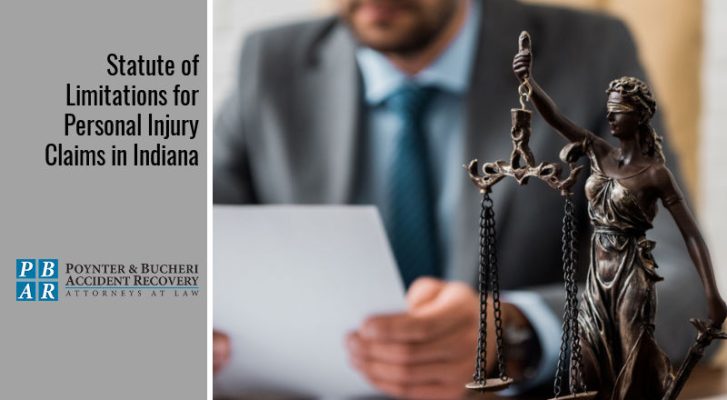
Statute of Limitations for Personal Injury Claims in Indiana

A statute of limitations refers to the amount of time someone has after an incident or injury to seek compensation from the liable party. Those who experience a personal injury from a car accident or another occurrence can seek damages from the at-fault party for medical bills, lost wages, loss of future earnings, and more, but they need to file within their state’s statute of limitations.
Every state has different rules regarding the duration of different statutes of limitations and their exceptions. In this blog, we go in-depth in discussing the statute of limitations for Indiana personal injury claims, exceptions to the statute of limitations, and whether you should hire an Indianapolis personal injury lawyer for your claim.
What’s the Statute of Limitations for Personal Injuries in Indiana?
Indiana Code section 34-11-2-4 states that the statute of limitations for personal injury claims is two years after the event occurs. You have two years after your injury to file a claim against the responsible party. Otherwise, you forfeit your right to receive compensation for your medical bills or any wages you lost due to your injury.
The two-year statute of limitations applies to different causes of personal injuries, such as car accidents, medical malpractice, dog bites, slip and falls, and more. The two-year statute of limitations also applies to wrongful death claims, meaning that if someone dies due to another person’s negligence, the victim’s family has only two years to file a claim.
Exceptions to the Statute of Limitations in Indiana
Two years may seem like an incredibly brief period to file a claim. Fortunately, there are exceptions to the two-year statute of limitations rule in Indiana, but they are uncommon. These include:
Disabilities
If someone is considered legally impaired, they have two years until after they recover to file a personal injury claim. Disabilities may include physical, emotional, or mental impairments. Once the victim is no longer considered disabled, they have two years to file their claim.
Children
Similar to disabilities, minors have two years after they reach the age of 18 to file a personal injury claim. For example, if you’re injured in a car accident at 15, you have two years until after your 18th birthday to file a claim, meaning you need to file before you turn 20.
However, medical malpractice and product liability do not offer the same exceptions as other personal injury claims. If a child is the victim of medical malpractice, they have two years after they turn eight years old to file, meaning they have until their tenth birthday. Courts do not take age into consideration when it comes to product liability, so minors have two years to file regardless of their age.
Nonresidence
Nonresidence refers to a liable person leaving the state of Indiana and no longer being a resident. If the person returns, the time in which they were a nonresident does not contribute to the duration leading up to the statute of limitations. For example, someone could injure you in a car accident and then become a non-Indiana resident six months after the incident. If they return to Indiana, you still have the remaining time that was left to file your claim, so in this example, you would have 18 months to file.
There is a critical exception to the nonresidence rule in Indiana. If the nonresident maintains an agent for service of process or another person who could be served on their behalf, the statute of limitations continues even if they’re not technically state residents. For example, if someone injures you in a car accident and becomes a nonresident but they maintain an agent for service of process in Indiana, you only have two years to file your claim. The statute of limitations does not pause because they maintained an Indiana agent for service of process.
Concealment
If the person responsible for your injuries conceals that they were at fault, the statute of limitations doesn’t start until their fault is discovered. For example, if you’re the victim of medical malpractice but the at-fault medical professional concealed their liability, the two-year statute of limitations won’t actually begin until their involvement and liability come to light.
Should I Contact a Lawyer for Personal Injury Claims?
Navigating the convoluted world of personal injury claims can be challenging, and although you have two years to file after an injury, the filing process is confusing and time-consuming.
If you’re considering filing a personal injury claim, you need to consult with a lawyer as soon as possible. A qualified personal injury attorney can help you prove and maximize your claim, but building a personal injury case takes time. Lawyers often need to gather witness testimonies and medical records, and it may take a long time to track down all of the relevant parties involved in the case. To ensure your legal representation has time to gather all necessary evidence to prove your claim, you need to contact a personal injury attorney as soon as possible.
Indiana Personal Injury Attorneys
For expert legal support in Indiana, contact the personal injury lawyers at Poynter & Bucheri Accident Recovery Attorneys at Law. Our attorneys have years of experience assisting Indiana residents with the filing and personal injury claims process. We can help you recover damages for medical bills, lost wages, loss of future earnings, physical and emotional pain and suffering, and more. Contact us today to file your personal injury claim before you run out of time. Call us at 1-800-265-9881, or you can click here for a free case review.
